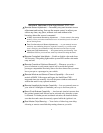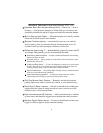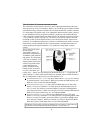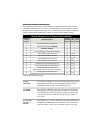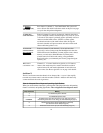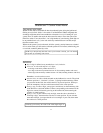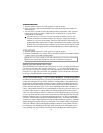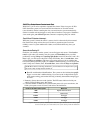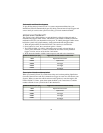
TO SILENTLY
ARM OR DISARM
THE SYSTEM . . . . . . .
Press button 3 (channel 3). Your IntelliGuard 700 system will
arm or disarm with all the indications noted on the previous page
except
for the chirp acknowledgments.
TO REMOTELY
OPEN THE TRUNK . . .
Button 2 (channel 2) controls an electronic interlock that allows
you to command a remote controlled option
only when the system
is disarmed
. This output is primarily used to optionally activate a
remote controlled trunk release. (NOTE: to ensure against
accidental activation of the trunk release while driving, the
electronic interlock will prevent remote activation of the trunk
release while the ignition is on).
TO ACTIVATE
OTHER OPTIONS
REGARDLESS OF
ALARM STATE. . . . . . .
Button 4 (channel 4) and channels 5–8 can activate other
accessories, such as remote controlled headlight activation, the
Clifford Electronics IntelliStart™ remote engine starter, remote
memory seat activation, SmartWindows II remote power
window/sunroof roll-down and venting, a Programmable
Receiver that lets you command your electric garage door/gate
opener(s), etc.
What about
channels 9 – 12?. . . .
Channels 9 – 12 control the Remote QuickAccess™ features:
remote valet mode entry/exit, remote controlled override of
optional sensor #2, and remote adjustment of each of the two
sensor zones. See Remote QuickAccess on page 14 for details.
AntiScan™
Thieves can disarm some other brands of car alarms with a “scanner” than rapidly
transmits one remote control code after another. Clifford’s AntiScan will detect any
scanner and block the codes it generates.
How to interpret the chirps and parking light flashes
When you use the remote control, the system responds with chirps (unless the chirp muting
feature is turned on) and parking light flashes. These chirp/flash acknowledgments mean:
Chirps and flashes Meaning
1
Your IntelliGuard system is disarmed
2
Your IntelliGuard system is armed
2 and then 4
Armed but there is a door open (if there was a 5-sec. delay) or the sensor is
malfunctioning (if there was a 10-sec. delay) (see Smart AutoTesting on page 15)
3
Disarmed but there was an intrusion attempt while you were away
(see Smart Prior Intrusion Attempt on page 16)
4
Armed but the hood or trunk is ajar (see Smart AutoTesting on page 15)
10





